- Home
- Captain W E Johns
44 Biggles and the Black Raider
44 Biggles and the Black Raider Read online
CAPTAIN W.E. JOHNS
BIGGLES AND THE BLACK INVADER
First published by Hodder & Stoughton, March, 1953
CHAPTER I DARK DEEDS
"Good morning, Bigglesworth. Come in. Take a pew, help yourself to cigarettes." Air Commodore Raymond, head of the special Air Section at Scotland yard, pushed the cigarette-box within easy reach of his chief operational pilot.
Biggles took a cigarette and flicked his lighter, glancing sideways at his chief with humour making little wrinkles round the corners of his eyes. "I have a feeling that such cheerful generosity so early in the morning is to prepare me for something more sinister than cigarettes."
"Quite right," acknowledged the Air Commodore. "As usual, I'm having a spot of bother."
"Where is the shoe pinching this time?"
"Africa."
"North, south, east or west?"
"I don't know."
"There's a lot of difference."
"So I believe." The Air Commodore smiled lugubriously. "Your best plan, I think, would be to start somewhere about the middle of the continent."
"And what am I to look for?"
"A black man."
"As there are quite a number of black men in Africa that shouldn't be difficult."
"I have a particular one in view."
"Ah! I was afraid of that. Is there something peculiar about him?"
"There are several peculiar things about him and none of them is nice. He stands six foot six and is broad in proportion. That should help you to recognise him."
"This heavyweight has, I take it, been making a nuisance of himself?"
"He has, and he still is. Nuisance is hardly the right word, though. He's a menace, and, as things are going, an extremely dangerous one. Take it easy for a minute while I tell you about him —or as much as is known, which is little enough."
"I'm listening," stated Biggles.
The Air Commodore settled back in his chair. "The story begins roughly three years ago, when a name became the subject of native whispers. It was Cetezulu. It belonged, so rumour asserted, to a gigantic native who had dubbed himself with the somewhat ambitious title of the Black Elephant. The gentleman has now gone a little further. Today he styles himself the Black Elephant, Lord of Africa. Don't smile. There's nothing funny about it. The elephant part of the name was not ill-chosen. As you probably know, bull elephants have a habit of turning rogue. No rogue elephant, has done as much mischief as this one. Rogue elephants are notoriously cunning. The rogue with which we are concerned is as elusive as if he were inspired by the devil himself.
"At home, in the first place, we didn't take this gentleman seriously.
Neither did the people, on the spot, if it comes to that. But they do now. So do we. For this scoundrel has embarked upon a career of wholesale murder and robbery, without parallel anywhere in the last fifty years—and that's saying something. I will enlarge upon that in a moment. His avowed intention, as his adopted name implies, is to make himself master of Africa. In that respect he may be genuine. Dictatorship has become a sort of epidemic. The world is full of people who think they were born to run, first their own country, then the continent, and ultimately, no doubt, the universe. Here we have a black man bitten by this bug. Notice the name—Cetezulu. It is obviously an assumed one, embodying the name of two of Africa's most famous black warriors: Cetewayo and Dinizulu. It is said that Cetezulu claims descent from Charca, the great Zulu king. Certain it is that he affects the old Zulu warrior's equipment—leopard-skin, ostrich feathers and so on. The few who have seen this fellow and survived are agreed: that he is a spectacular figure of a man."
"Where did he come from in the first place?" enquired Bigg1es.
"There are plenty of opinions about that; but the truth is, nobody knows for certain," answered the Air Commodore. "One story is that he was born in Kimberley and at one time worked in the mines there; but having killed a foreman, he bolted. Others say that he came from as far north as the Sudan. Some believe he was born in Kenya and was brought up at a Mission School there. But as I say; nobody knows for certain; although from the fact that he speaks English well we may assume that he was once in contact with white men." The Air Commodore smiled wryly. "Maybe it was from them that he got the dictator idea, if he is genuine in that. He may not be. That may be merely a cover for his villainy, to impress the credulous natives. But let us stick to what we know." The Air Commodore reached for a cigarette.
He resumed. "What we might call the first official appearance of this trouble-maker was in a native Reserve in Kenya, where he became conspicuous as an agitator determined to stir up strife with the workers.
He overdid it when, having got into debt at the store, he hit the store-keeper on the head with a bottle and departed before the police could lay their hands on him. He was next heard of as a game poacher and some of the native methods of trapping wild animals were not pretty. The game ranger who went after him was murdered out of hand. From that time he has moved about Africa, leaving a trail of the most brutal murders. He has killed blacks and whites without discrimination, seizing their possessions and burning their homes. In a word, he has instigated a reign of terror which, if it goes on, will end in much of the country being depopulated. People are leaving their homes and going to the cities for protection. When I say he moves about Africa, I mean that literally. He strikes here, there and everywhere. Today he might be in Northern Rhodesia. In a week we may hear of him in Uganda. Within a fortnight he may be in the French or Belgian Congos, or Portuguese Angola."
"How does he manage that?"
The Air Commodore stubbed his cigarette. "It seems that he has developed the same technique as his namesake, the elephant. There are still a good many wild herds in Africa. While they behave themselves they are reasonably safe. Indeed, they are protected by law. But there are some bad hats among them who have tried to make a living the easy way by making night raids on the natives' mealie patches and banana plantations.
The natives complain, not without reason, whereupon a white hunter goes out to administer punishment calculated to discourage this practice. In fact, some of the older animals are shot. The others know why.
Unfortunately, they are not necessarily cured of their bad habits and several lessons may be necessary. In the end, it becomes a game of tip-and-run. A herd, knowing that punishment will follow a raid, puts as great a distance as possible between itself and the inevitable pursuit.
"These are the tactics employed by Cetezulu. He strikes, and runs, travelling only by night and hiding in thick cover by day. Which means, really, that he disappears. He moves far and fast. We have it on record that he has travelled fifty miles a day for a week. Imagine what that means. It's practically impossible to catch up with him. It may be a week, or even a month, before word of his latest crime reaches the authorities. In that time he may have moved hundreds of miles in any direction. With millions of square miles in which to operate it has so far been impossible to get near him. He is rarely seen, with the result that everybody, black and white, is on the jump, wondering if he is next on the list."
"I imagine he isn't running this racket single-handed?"
"Oh dear no. He started in a small way, but success has enlarged his gang until, so it is said, it numbers thirty or more. Dictators are never short of supporters to share in the loot. Men like Cetezulu attract to themselves others of their own kidney and therein lies the greatest danger. Unless something is soon done to end the career of this scoundrel we may expect his gang to grow to hundreds, and eventually, perhaps thousands. It is said that he is forcing men to join him—black men, of course, holding out the promise of a black African empire for the Africans. S
ome tribes that have refused to co-operate with him have had their villages burnt and their cattle stolen. Natives live on their cattle. To lose them means starvation. One can hardly blame them, therefore, if they choose to serve the Black Elephant rather than invite certain death."
"But surely some of the law-respecting tribes are strong enough to resist this rascal?"
"One would think so, but so far that has not been the case. The trouble is, the very name, Black Elephant, has done something to strike terror.
Anyway, the fact remains that when the whisper goes round that the Black Elephant is approaching, people either fly for their lives or, put at his disposal everything they possess."
"You don't mean that the white settlers do that?"
"What else can a man do but get out of the way, particularly if he has a wife and family? At first, not realizing the desperate nature of the danger, most of them faced it, and lost their lives. They realise now that there is nothing they can do. All ranches, coffee estates and the like, depend entirely on native labour. Mention of the Black Elephant is enough to scatter them. The white proprietor or manager is left alone.
Even though he has weapons, and he usually has guns and rifles, what hope has he of holding off an attack by thirty or more black fanatics? His only chance is to get wind of the impending raid and bolt. In that case he may save his life, but only at the cost of everything else he possesses. He returns to find his house razed, his cattle gone and his crops destroyed. Up to date the Black Elephant has murdered not fewer than twenty whites and an unknown number of black people. He has killed hundreds of Indian traders and labourers. He seems to hate them."
"And this, you say, has been going, on for three years?"
"Yes, but it has got rapidly worse during the last few months."
"It's time it was stopped."
"It will have to be stopped, before more blacks join this villain or follow his example. The trouble is not con fixed to us. Every country with possessions in Africa comes into this ugly picture."
"What has been done about it so far?"
"Plenty. But nothing has been achieved. Apart from the fact that to locate this man is about as hopeful a proposition as looking for a flea in a flock of sheep, ordinary ground forces are too slow, even though they are provided with motor transport. Cars, jeeps, motor cycles and light vans can only operate on tracks or smooth ground. Cetezulu knows that perfectly well and stays in rough country, which is not difficult in Africa. As I told you at the beginning, this black devil moves across country at fantastic speed. The last raid, two days ago, was a particularly horrible murder in Northern Rhodesia. A white woman and her four children, with one or two loyal black ser giants, were burnt alive in their own bungalow. The husband had gone to Broken Hill on business.
The Black Elephant had apparently been hiding just inside the Belgian Congo. There is no indication of which way the murderers have gone. They may have gone north to Uganda, east to Mozambique or west to Angola. You see how hopeless it is. Police, game rangers, and the Askaris, have all been out, but it is like chasing a will-o'-the-wisp."
"How many people have actually seen this brute?"
"Few have seen him at close quarters and survived. The best witness we have, a very lucky fellow, is a Masai tribesman named Mishu. He was gun-bearer to Major Harvey, a game warden, whom he saw murdered. That was about three months ago. Harvey claimed that Mishu was the steadiest-gun-bearer in Africa. They had worked together for years."
"What happened?"
"Well, it seems that a travelling missionary brought in a tale about a man-eating leopard. Harvey went to investigate but he didn't find it.
While he was in the district be shot an old bull buffalo that had killed several natives in the Mapika district. The beast did not drop to his shot but blundered off into an area of elephant-grass and bamboo. Harvey dared not leave it there in that condition, of course, because it would have been a bigger danger than ever. So with Mishu he took a chance and followed it into cover. Instead of finding the buffalo, they found themselves suddenly face to face with Cetezulu and his gang. They had evidently spent the night there. Harvey may not have realised who the men were. Anyway, before he could speak, Cetezulu had flung an assegai which killed him on the spot. Mishu would have been next, no doubt, but at that moment the wounded buffalo, which must have circled round on its tracks as they sometimes do, arrived on the scene, steaming for revenge. There was a stampede, and in the general panic Mishu managed to hide in the bamboo until it got dark, when Cetezulu cleared off. Mishu had a good view of him. He describes him as an enormous man, with a slight cast in one eye, dressed in full Zulu chief regalia. A punitive force of police was rushed to the spot, but the Black Elephant had done his usual vanishing trick. He next popped up in Tanganyika, where he burned a native village after looting the local store."
Biggles tapped the ash off his cigarette with thoughtful care. "Why are you telling me about this?"
"I thought you might he able to make a suggestion as to how we could get to grips with this fiend."
"You're not going to suggest, I hope, that the total strength of four men is capable of arresting thirty or more, black desperadoes—even if we could find them?"
"Er—no."
"What can I do about it then?"
"That's what I want you to tell me."
Biggles thought for a moment. "You say that when Cetezulu raids a ranch, he makes off with the cattle?"
"Yes. In Africa cattle are money."
"You can put money in a bank, but cattle take up more room. What does he do with the stolen property?"
"How would I know? Does it matter?"
"It might. I take it he has raided several ranches?"
"Yes. He must have taken hundreds of head of cattle."
"More than he could eat?"
"Good gracious! Yes."
"Then I repeat, what does he do with them?"
"Why do you ask?"
"Because if he hasn't eaten this stock, he must have put it somewhere for safe-keeping, until such time as he can find a market for it, even if he has a market for it now; in Abyssinia for instance, where there is always a market for cattle. The stuff must still be on the hoof. He's bound to have a hide-out somewhere, where there is an ample water supply for the herd. To that place he is also bound to return at intervals, to make sure that the stuff is all right."
"That's true."
"Then instead of looking for this elusive brigand; I suggest it might be more profitable to look for the stolen cattle, which will be less mobile than he is."
"And then?"
That 's where you should catch him. Instead of chasing wild geese, it's better to wait for them to come to you."
"First of all you've got to find this hide-out. That would be difficult."
"Granted. But I submit that it's easier than looking for something that's always on the move. You asked me for a suggestion. That's it. If you can think of something better, go ahead."
"In an aircraft you could cover a lot of ground," conceded the Air Commodore.
"That's what I was thinking," answered Biggles. "As much ground could be searched in a week as would take a ground force a year. Moreover, we should be on a look out from an angle for which the Lord of Africa might not have made allowances. It would be a comparatively easy matter to construct a stockade that might be passed unnoticed from ground level, but it would not be so easy to roof it over so that it couldn't be spotted from above."
"I think you've got something there," agreed the Air Commodore. "I see one big snag. Native herds of cattle are dotted about the whole of Africa. How will you know which is the right one?"
"By trial and error. One would have a guide, anyway."
"What sort of guide?"
"Water. Cattle, whether they are standing still or on the move, need water all the time. No matter how far away from the scenes of his crimes the Black Elephant's cattle compound may be, of one thing you may be sure. There will be, along the route
, a series of lakes, or rivers, waterholes or what have you, within a day's march of each other.
Cetezulu, not being a fool, would take that into account when selecting his line of retreat. There are big areas of Africa where water does not occur at all. They can be ruled out. Follow your chain of water-holes and at the end of one of them you'll find the stolen cattle. Wait by the cattle and sooner or later the Lord of Africa will roll up to count his wealth."
"Would you like to take on the job?"
Biggles sighed. "I was afraid it would come to that."
The Air Commodore smiled. "You knew it would, from the start of the discussion. Already you've provided a clue which no one else seems to have thought of. Will you go?"
"What exactly do you want me to do?"
"Arrest this self-appointed Lord of Africa of course."
Biggles shook his head. "Nothing doing. I've to much regard for my body to offer it as a pin-cushion for assegais. This man and his gang are murderers. They know that if they're caught they'll swing. They'll see to it that they don't get caught. Not fewer than fifty men would be needed to fight it out with that bunch of savages."
"If he attempted to use force you would be justified in doing the same thing."
"In other words, I wait until I have a spear stuck in me and then I can shoot back. Oh no. There's only one sensible way of dealing with an armed murderer—shoot first."
"That's a bit savage."
"We're dealing with a savage. Kid glove methods will get you nowhere except in a wooden box under the ground. I'm not suggesting shooting the fellow in the back; or when he's asleep; or anything like that. I'd employ the methods we used in the R.A.F. with certain tribes on the North-West Frontier and the Middle East. You remember the procedure.
First you dropped leaflets inviting them to give themselves up for a fair trial, if that doesn't work, you make a demonstration by flying over them to let them see you mean business. That's a fair enough warning. If it doesn't have the desired effect—well you give them a taste of musket balls. In other words, if they prefer it that way, that's how they can have it. The choice is theirs. Of course, if, having found the man, one was in radio contact with a highly mobile ground force, one could call them up and leave the business to them. It would mean moving fast. One night would be enough for the Black Elephant to slip away out of reach—

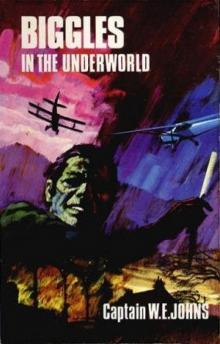 Biggles in the Underworld
Biggles in the Underworld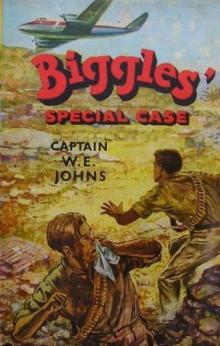 Biggles' Special Case
Biggles' Special Case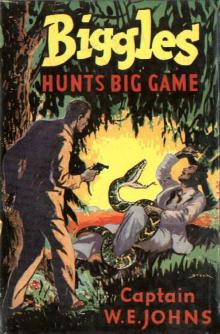 34 Biggles Hunts Big Game
34 Biggles Hunts Big Game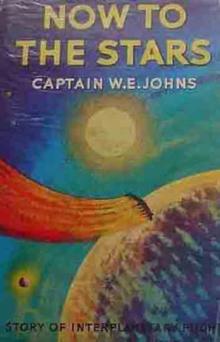 03 Now To The Stars
03 Now To The Stars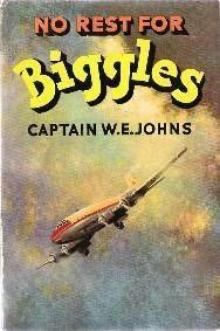 55 No Rest For Biggles
55 No Rest For Biggles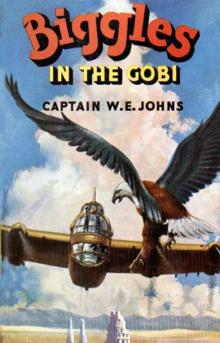 46 Biggles in the Gobi
46 Biggles in the Gobi 52 Biggles In Australia
52 Biggles In Australia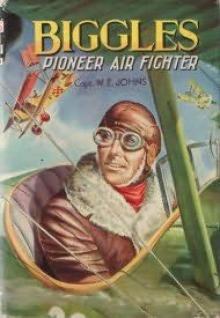 51 Biggles Pioneer Air Fighter
51 Biggles Pioneer Air Fighter 05 Biggles Flies East
05 Biggles Flies East 28 Biggles In Borneo
28 Biggles In Borneo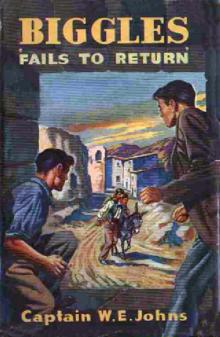 29 Biggles Fails to Return
29 Biggles Fails to Return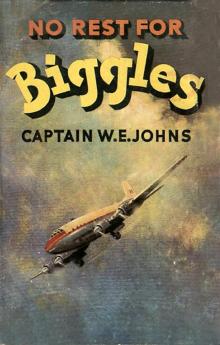 55 No Rest For Biggles (v2)
55 No Rest For Biggles (v2)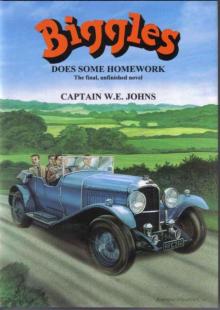 Biggles Does Some Homework
Biggles Does Some Homework Biggles of the Camel Squadron
Biggles of the Camel Squadron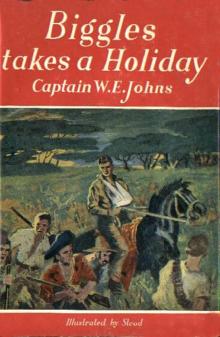 35 Biggles Takes A Holiday
35 Biggles Takes A Holiday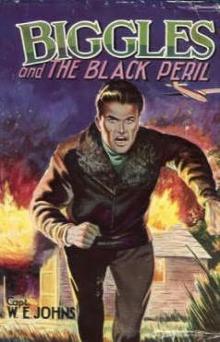 Biggles And The Black Peril (06)
Biggles And The Black Peril (06)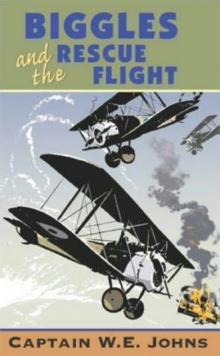 17 Biggles And The Rescue Flight
17 Biggles And The Rescue Flight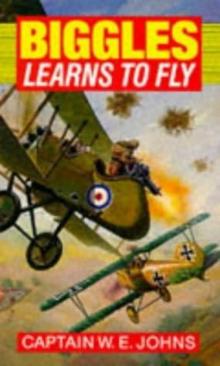 Biggles Learns To Fly
Biggles Learns To Fly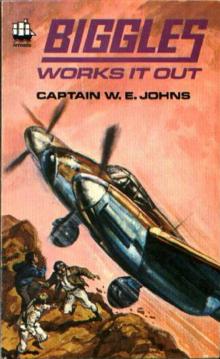 40 Biggles Works It Out
40 Biggles Works It Out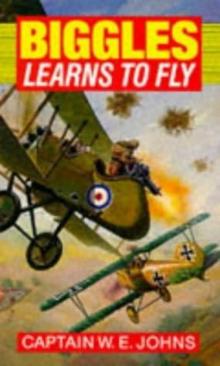 05 Biggles Learns To Fly
05 Biggles Learns To Fly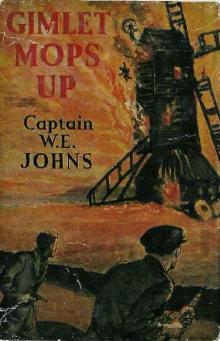 04 Gimlet Mops Up
04 Gimlet Mops Up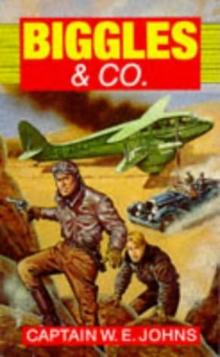 10 Biggles and Co
10 Biggles and Co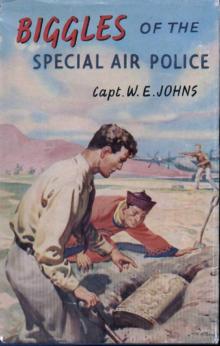 47 Biggles Of The Special Air Police
47 Biggles Of The Special Air Police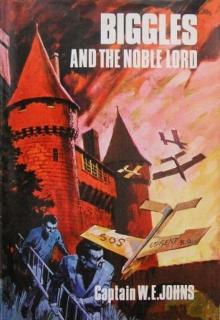 Biggles and the Noble Lord
Biggles and the Noble Lord T2 Return To Mars
T2 Return To Mars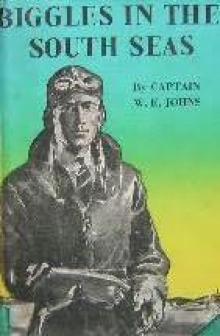 21 Biggles In the South Seas
21 Biggles In the South Seas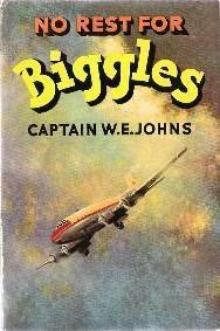 No Rest For Biggles
No Rest For Biggles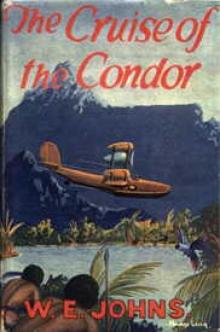 Biggles In The Cruise Of The Condor (02)
Biggles In The Cruise Of The Condor (02)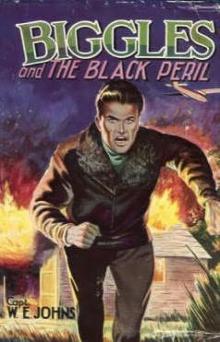 06 Biggles And The Black Peril
06 Biggles And The Black Peril Biggles and the Deep Blue Sea
Biggles and the Deep Blue Sea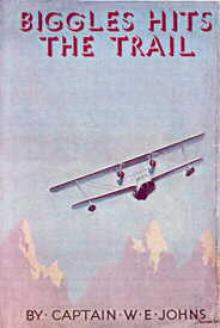 06 Biggles Hits The Trail
06 Biggles Hits The Trail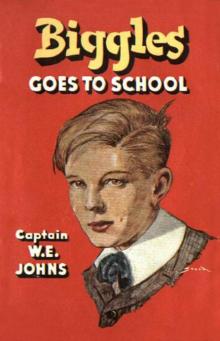 39 Biggles Goes To School
39 Biggles Goes To School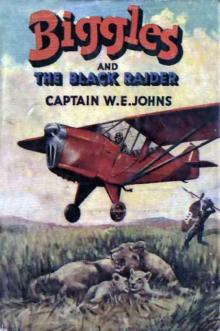 44 Biggles and the Black Raider
44 Biggles and the Black Raider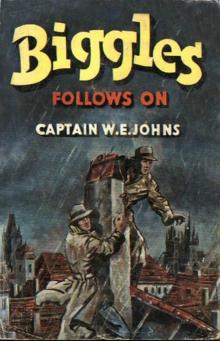 42 Biggles Follows On
42 Biggles Follows On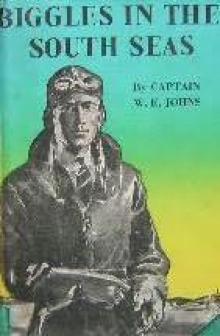 Biggles In the South Seas
Biggles In the South Seas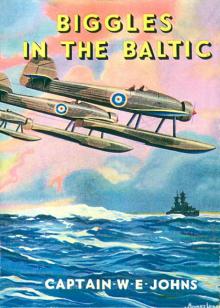 21 Biggles In The Baltic v3
21 Biggles In The Baltic v3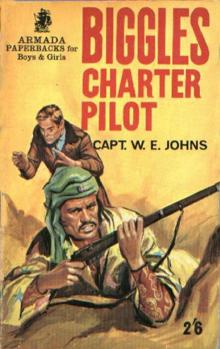 27 Biggles - Charter Pilot
27 Biggles - Charter Pilot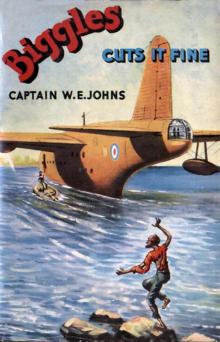 49 Biggles Cuts It Fine
49 Biggles Cuts It Fine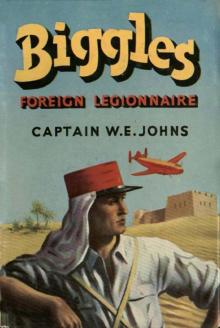 51 Biggles Foreign Legionaire
51 Biggles Foreign Legionaire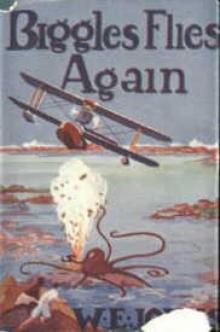 04 Biggles Flies Again
04 Biggles Flies Again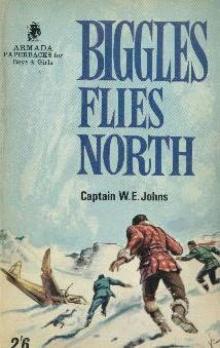 16 Biggles Flies North
16 Biggles Flies North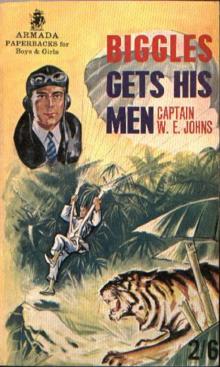 37 Biggles Gets His Men
37 Biggles Gets His Men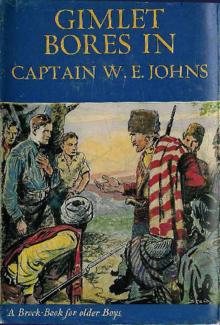 07 Gimlet Bores In
07 Gimlet Bores In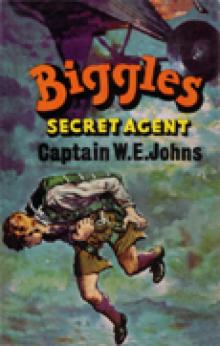 19 Biggles Secret Agent
19 Biggles Secret Agent 32 Biggles In The Orient
32 Biggles In The Orient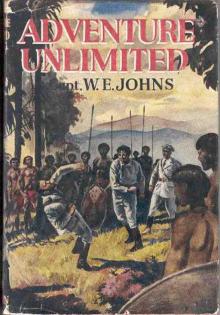 Adventure Unlimited
Adventure Unlimited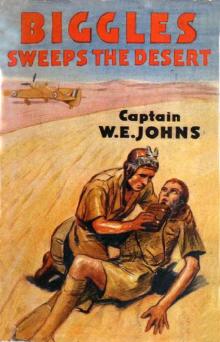 26 Biggles Sweeps The Desert
26 Biggles Sweeps The Desert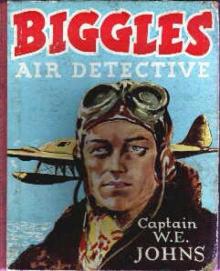 Biggles Air Detective (43)
Biggles Air Detective (43) 36 Biggles Breaks The Silence
36 Biggles Breaks The Silence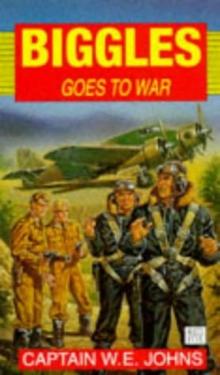 14 Biggles Goes To War
14 Biggles Goes To War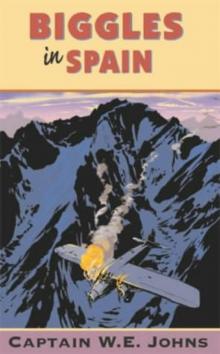 18 Biggles In Spain
18 Biggles In Spain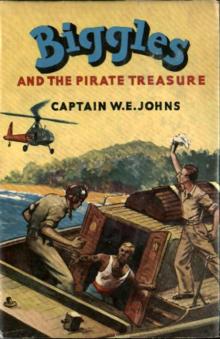 50 Biggles and the Pirate Treasure
50 Biggles and the Pirate Treasure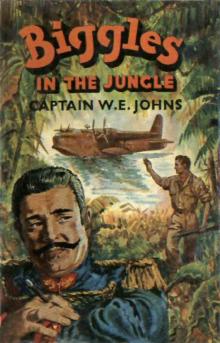 25 Biggles In The Jungle
25 Biggles In The Jungle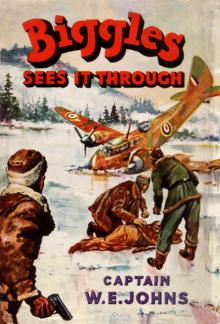 23 Biggles Sees It Through
23 Biggles Sees It Through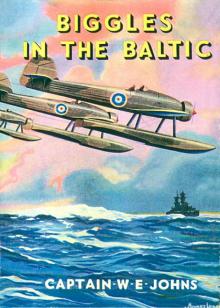 21 Biggles In The Baltic
21 Biggles In The Baltic 24 Spitfire Parade
24 Spitfire Parade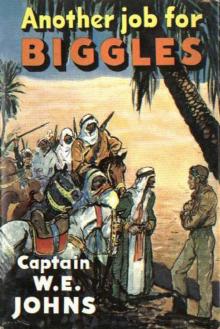 38 Another Job For Biggles
38 Another Job For Biggles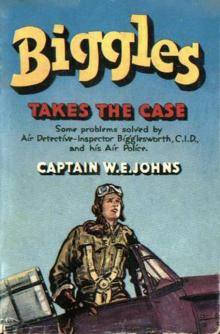 41 Biggles Takes The Case
41 Biggles Takes The Case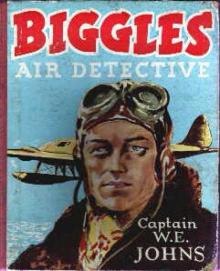 43 Biggles Air Detective
43 Biggles Air Detective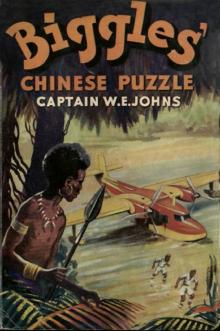 53 Biggles Chinese Puzzle
53 Biggles Chinese Puzzle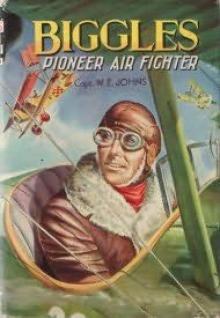 Biggles Pioneer Air Fighter (51)
Biggles Pioneer Air Fighter (51)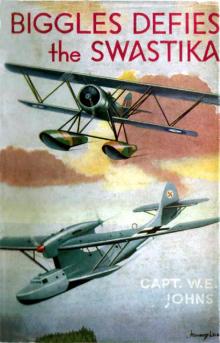 22 Biggles Defies The Swastika
22 Biggles Defies The Swastika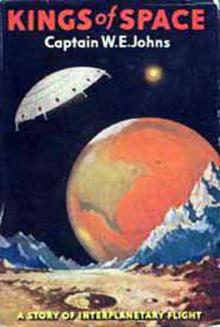 01 Kings Of Space
01 Kings Of Space